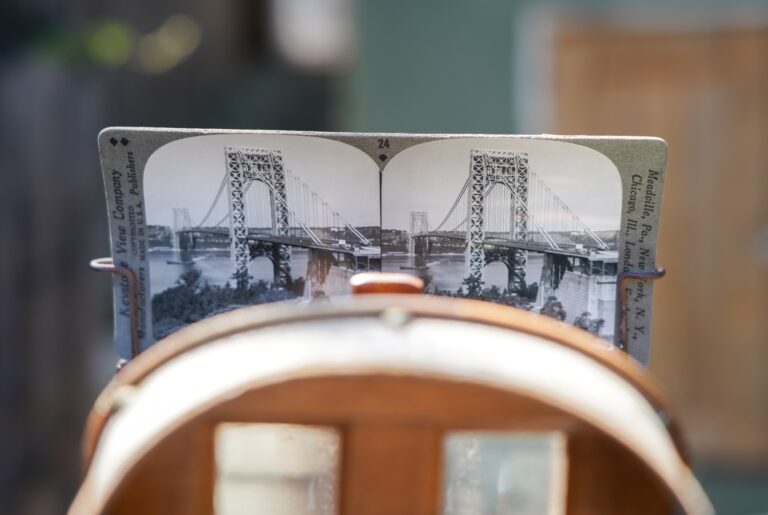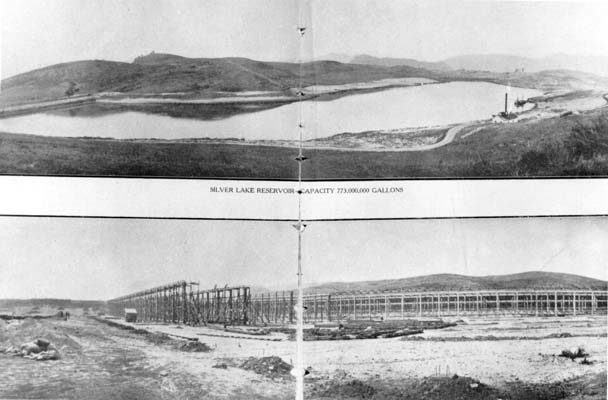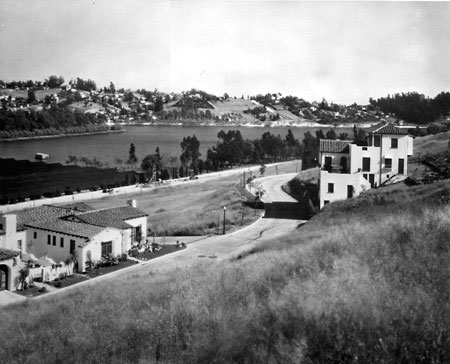Intro: How I Found These Stereographs
Just yesterday, I was digging through an antique/consignment shop in San Diego when I found a stack of stereograph cards. At first, I thought they’d be the usual Keystone or Underwood & Underwood mass-market cards I always come across, but these were different! No publisher stamps. No world landmarks. Just handwritten notes. When I read the captions, I realized they were from Silver Lake, Los Angeles, and dated around the 1910s. That was enough to take them home with me.
Quick Background: Silver Lake in the Early 1900s
To put these cards into context, here’s what was happening in Silver Lake back then:
Building the reservoirs
The Ivanhoe Reservoir was put into service in May 1906, and the Silver Lake Reservoir followed in March 1908. Both were designed by William Mulholland and named to honor Herman Silver, a Water Commissioner. These reservoirs played a crucial role in expanding L.A.’s water system and turned the area into a desirable residential landscape.
Image Source: Silverlake.org Historical Photos
Neighborhood naming
The area was once called Ivanhoe, but after the reservoir opened, the name “Silver Lake” took hold. Many surrounding streets were given Scottish-themed names like Rowena, Kenilworth, and Angus.
Image Source: Silverlake.org Historical Photos
New infrastructure
In the years following 1908, Silver Lake began transforming. Streets were being cut through hills, and some estates even boasted private stairways to the lake. At the same time, the arrival of the Red Car (Pacific Electric) line and completion of Glendale Boulevard in 1915 made the neighborhood more accessible.
Image Source: Silverlake.org Historical Photos
Timeline Snapshot:
- 1908–1909 → The Silver Lake Reservoir was built as part of the Los Angeles Aqueduct project. It was named after Herman Silver, a city water commissioner.
- 1909–1911 → The Ivanhoe Reservoir followed just north of Silver Lake and was in service by 1911 .
- 1912 → Street grading and infrastructure work began around the reservoirs. My stereograph labeled “9. Historical Silver Lake House LA Stereograph Photo, 1912” shows this phase.
- 1913–1914 → Landscaping and villa construction appeared along the reservoir’s edge. This matches my stereograph dated July 16, 1914 showing cypress trees, pathways, and the “Windhurst” gateway.
(Sources: Early LA Reservoirs, Silver Lake Neighborhood Council, Eric Brightwell)
I’m not an LA native, but I lived in LA for almost 10 years, and this timeline seems to line up with what I know of the area’s history. That said, if I’ve gotten anything wrong, I’d love to know!
Quick Note: What’s a Stereograph?

In case you’re not familiar, a stereograph is a photographic card with two nearly identical images. When viewed in a stereoscope, they merge into a 3D scene. During the late 1800s and early 1900s, these were popular home entertainment. Think of them as the Netflix of their day. Most surviving examples feature famous landmarks, and were made by major national publishers of the era, such as Keystone View Company and Underwood & Underwood. These Silver Lake cards are rare because they likely weren’t made to sell en masse—they feel personal, local, and too specific to disappear into mass archives.
The Silver Lake Cards I Found
Here are the cards I found:
1. Historical LA Courthouse Clock Tower Stereograph Photo, 1906
Date: 1906
Modern-Day Location: Temple Street, between Broadway and Spring Street. Damage sustained in the 1933 earthquake made the building unsafe, and it was demolished in 1936. (Seaver Center for Western History Research, Natural History Museum of Los Angeles County)
Backside Writing: “Xmas Day, 1906, L.A. Courthouse Clock Tower From Fort Hill Villa, 410 N. B’dway“
2. Historical Pershing Square, LA Stereograph Photo, Date Unknown
Date: Unknown
Modern Day Location: Pershing Square, Downtown Los Angeles at 532 S. Olive St.
Frontside Writing: “Pershing Square L.A.“
3. Driveway & Mountain View Along Historical Silver Lake Reservoir, LA Stereograph Photo, Date Unknown
Date: Unknown, Possibly 1900-1920
Modern-day Location: Suspected to be around the 2300 block of West Silver Lake Drive
Frontside writing: (bottom) “Gateway to ‘Windhurst’ + Stairway to lake” & (Right) “Entrance Gate, Windhurst Silver Lake + (?Benson?) Tree“.
Backside writing: “Ch(?)pp(?) R(????) at Windhurst (?) Silver Lake“
9. Historical Silver Lake House, Stereograph Photo, 1912
Date: Oct 5, 1912
Modern-day Location: Suspected to be somewhere along West Silver Lake Drive. Possibly documenting the original paving of West Silver Lake Drive.
Backside Writing: “Making the street at Silver Lake. Raised level (?) 4 feet above height when house was built“
10. Frontside of Historical Silver Lake House LA Stereograph Photo, 1913
Date: Feb 1, 1913
Modern-day Location: Unsure, but it’s possible that the “Windhurst” house stood on the western shore of Silver Lake Reservoir, along West Silver Lake Drive, facing east across the water toward today’s Silver Lake Meadow and Ivanhoe Reservoir area.
The exact street number has been harder to pin down, but the best evidence points to the stretch of West Silver Lake Drive between Armstrong Avenue (south) and Tesla Avenue (north).
Writing: None
11. Historical Sierra Madre LA Stereograph Photo, 1913
Date: April 28, 1913
Modern-day Location: Suspected to be in the Sierra Madre area of Los Angeles.
Backside Writing: “View From (?) at (?Carters?), Sierra Madre“
Note 1: To my best guess, the last phrase says “Sierra Madre” instead of the usual “Silver Lake” messaging other cards have in this collection.
Note 2: The existing handwriting looks like someone re-wrote over older handwriting. This was possibly done by a new owner as the cards passed down, to preserve the message. Or, the original writers erased and re-wrote the message. The new writing seems to be an exact-tracing of what was previously written.
What I’ve Learned So Far
Here’s the fun part! Piecing together what these cards might show:
- The likely location: Based on the ridgeline and lake orientation, it seems that many of these were shot from around the 2300 block of West Silver Lake Drive, near Angus Street. It looks like these photos were taken from hillside homes above the water.
- Windhurst Estate: A couple cards cards reference “Windhurst.” “I haven’t found this estate in directories or archives yet, so it may have been a private name or a small subdivision. Further research in property records could help.
- Not mass-market photos: These don’t appear in Keystone or Underwood catalogs or have any branding on the cards. That means they were probably made by a local photographer or studio.
- The handwriting matters: Without those captions, these could be mistaken for anywhere. But the dates and place names (“Silver Lake” “LA” “Windhurst,” “1912,” “1914”) anchor them in a real neighborhood during a specific moment of growth. It’s unclear if this is original handwriting, but I’m inclined to believe it is. However, it’s possible that it was written by another researcher who owned these in the past.
- Tracing archives: I haven’t located exact matches in LAPL, USC, or Huntington collections. That’s both exciting (possibly unique) and frustrating (hard to verify).
In other words: I believe these cards are rare survivors. They’re not in the big institutional archives (at least not cataloged online).
Why Non-Commercial Stereographs Are So Cool
Most stereographs you see today are mass-produced. They’re still fun, but they’re generic: the same 50 landmarks printed a million times. Homemade or locally produced stereographs are different. They were made by real people, for real people. When you hold one, you’re literally standing in the shoes of someone in 1914 who thought, “I want to remember this garden, this stairway, this lake.”
That’s what makes them so neat, they show life!
Collectors & Historians: Can You Help Piece the Story Together?
I’m sharing these cards because I’d love to know if anyone else out there has seen similar images, and may be able to help me figure out the context of the photos.
- Have you come across other Silver Lake or Ivanhoe stereographs from 1900–1925?
- Do you know anything about the Windhurst property?
- Are there archives or local collections I should be looking at?
If you’re a collector, librarian, or LA history buff, I’d love to hear from you!
Please reach out through my contact page or send me a message on Instagram. Even if you just have a hunch or a scan, I’d love to compare notes.
Final Thoughts
When I bought these cards, I thought they’d just be an interesting local addition to my shelf (and a fun research project). The more I study them, the more I realize how interesting they are, and how much they can teach us about everyday Los Angeles in the early 1900s.
And maybe, just maybe, someone reading this has additional information to add to this series. If you do, let’s bring the pieces together!
If you have any information, please reach out through my contact page or send me a message on Instagram.
Warm regards,
Lexi
Resources & Further Reading
If you’d like to dig deeper into the history of Silver Lake, Los Angeles, and the stereograph era, here are some resources worth exploring:
- Eric Brightwell: Visiting the Silver Lake Reservoir – A personal essay blending history and cultural context around the reservoir’s evolution. Read here
- Silver Lake Neighborhood Council: History – Concise overview of the neighborhood’s development and historical milestones. Read here
- Silver Lake.org: Historic Photos of the Lake Area – Archival photos showing Silver Lake through different eras. View here
- Silver Lake.org: About Silver Lake – Community-written history covering the naming, reservoirs, and neighborhood growth. Read here
- Around the Reservoir Blog – Informal but detailed exploration of Silver Lake’s local history and changes over time. Read here
- Wikipedia: Silver Lake, Los Angeles – General background on the neighborhood, with history, geography, and cultural notes. Read here
- Water and Power Associates: Early LA Water Reservoirs – A deep dive into the city’s early reservoirs, including Ivanhoe and Silver Lake. Read here
- Los Angeles Public Library Photo Collection – Archival stereograph image of Silver Lake and other LA landmarks. View here
- California Supreme Court Historical Society: Los Angeles County Courthouse – Detailed history of the historic courthouse, including its destruction after the 1933 earthquake. Read here


![Northwest view from southeast end. Cove or Earl looking at Silver Lake Blvd. 1930s [photo courtesy of Doug Baldwin]](https://www.lexigerdtsphotography.com/wp-content/uploads/2025/08/RESERVOIR_LOOKING_NW_CIRCA_1930S-768x507.jpg)

Previous Post
Asheville Travel Guide 2025: Hikes, Food, & Local Shopping in the Blue Ridge Mountains